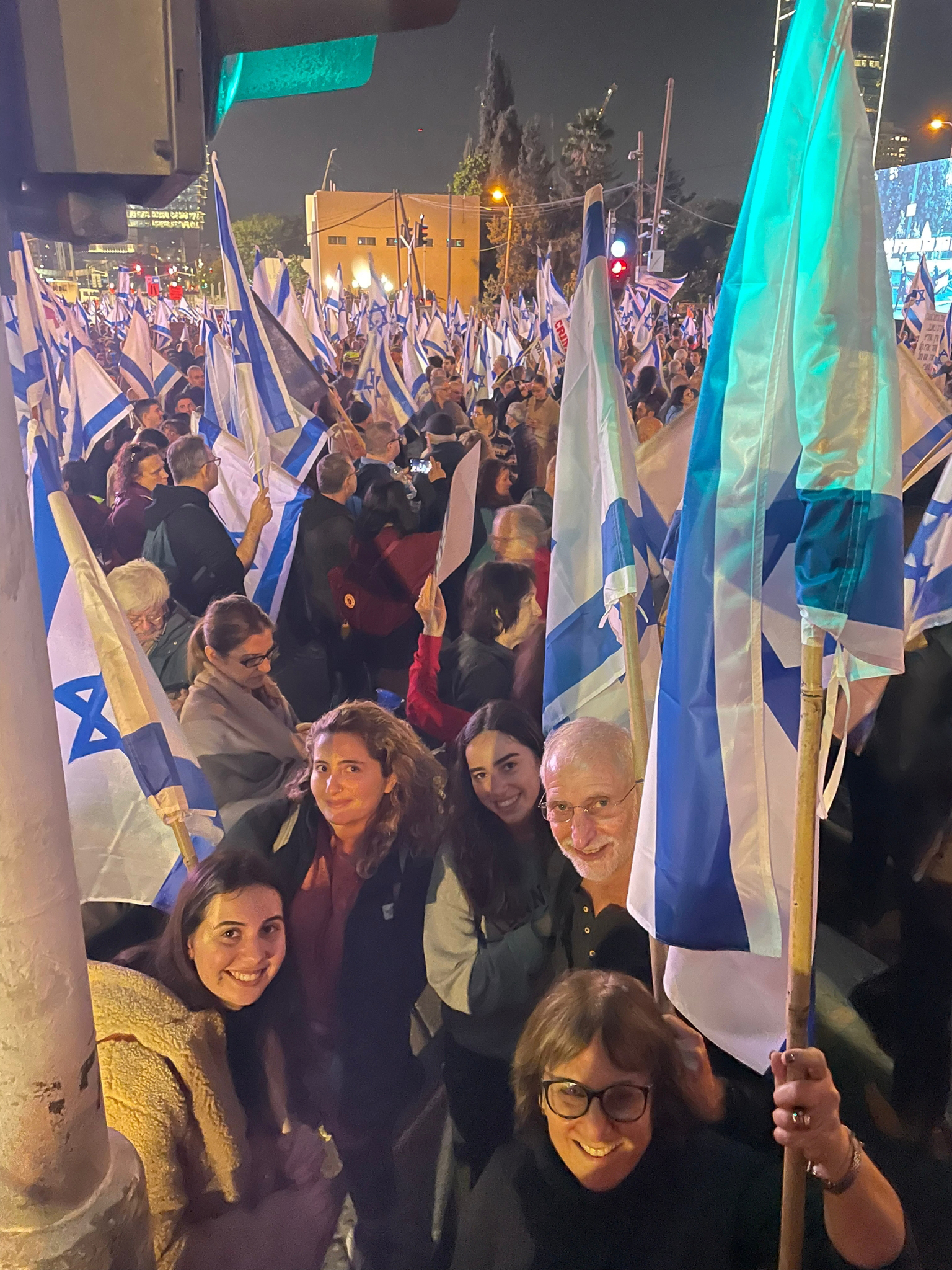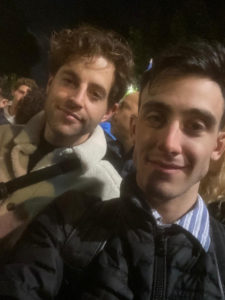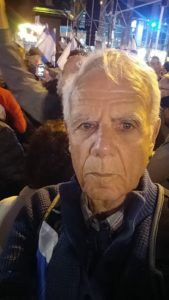
Israel

SA olim join throngs in Tel Aviv protest
“It was my first demonstration since making aliya in 2021, and the atmosphere was electric,” says Samuel Hyde, who was amongst the 110 000 people that rallied in Tel Aviv on the evening of 21 January. He was one of a number of South African olim who felt it was vital that they protest against Israel’s new government and its possible changes to the judiciary.

“I agree with the basic fundamental principles of why people are protesting,” says Hyde of the protest, the third week of demonstrations, in which thousands more gathered in other cities. “They are patriotic Israelis who don’t agree with judicial reforms. They believe in the Zionist vision of the state as Jewish and democratic, and don’t feel that the people in power right now are representative of that.
“The atmosphere was partially a carnival and partially outrage”, says Jonathan Schwartz, who made aliya in 1978. “People don’t like being stripped of their democratic rights.”
Max Moss, who made aliya from Cape Town in the 1960s, says that people from all walks of life attended. “The organisers handed out hundreds of Israeli flags, which created a feeling of unity. The atmosphere was peaceful.”

He attended because “I feel that my country is being swept from under my feet. Israel is home to all Jews, but this government is sowing divisions to achieve its objectives. With this government, there is no hope of South Africa and Israel finding any common ground. If we go down this path, Israel will become a different country.”
Schwartz attended because “Israel’s new government seeks to destroy any checks and balances on the power of government. It’s a coalition of radical interest – the haredi parties want to prevent the Supreme Court from being able to enforce things like an equitable draft system; the Shmotrich-Ben Gvir factions want to stop the High Court from applying international law to the West Bank; and Netanyahu seeks to stay out of jail.
“To that end, Netanyahu is giving a free hand to Yariv Levin, his ‘justice minister’ to ‘reform’ the legal system,” he says. “The government claims to have a popular mandate for these reforms, but the coalition parties received about 48.4% of the popular vote. They owe their technical majority in the Knesset to the failure of leadership in the pro-democracy block.”
Daniel Hasson, who made aliya in the 1990s and is the executive director of the Jerusalem Intercultural Center, says, “These protests are significant in the challenges facing Israeli society, and anyone – left or right – who cares about our shared future should join.
“Democracy isn’t just about the will of the majority, it’s also about check-and-balance mechanisms such as a free and open media and the neutrality of the courts – both of which are under direct attack – and about protecting the rights of minorities,” he says.
“Many agree that the power of the High Court needs to be addressed,” says Hasson. “The motive for such a move will be to ensure that the so-called will of the people is taken into account. The problem in the Israeli case is the timing. It’s seen by many, left and right, as a move by Netanyahu to interfere with the court cases against him. If the process was to happen more slowly and in a more inclusive way, I’m sure that the public would be open to weighing the options.”
Stanley Barkan, who made aliya in 1970, attended a smaller protest in Haifa. “Politicians like Gidon Saar and Shasha Biton spoke, and it encouraged me to believe that there are also Likud politicians who are unhappy with the legal proposals.” He hopes they will “speak up from within”.
Paul Mirbach, who made aliya in 1982, says, “As much as I was fired up to live in Israel and build my kibbutz, I was relieved to leave behind an unjust society. Now, all that I have worked for is being wrested from me by an extremist government using a small majority of four votes to transform this country into something it was never meant to be.”
Jonathan Zausmer made aliya in the 1970s. Along with the wide-ranging judicial changes allowing the government to dominate the legal system, he says there are other things at stake. For example, the new government would consider annexation of a large part of the West Bank, which could result in a minority ruling over a majority. Then, there are fears about the economy and disinvestment, as well as homophobia and the freedom of minorities.

“One part of the population is supporting the other [both with army service and economically],” which “drives people crazy, across the spectrum,” says Zausmer. With the new government talking about adding measures to increase this, the schism between sectors will grow.
He asks that diaspora communities “take a closer look. A strong statement from the diaspora would make an impact. Even Israel advocates like Alan Dershowitz are saying that things have gone too far.”
But Rob Davis, who made aliya in 1996, specifically chose not to attend the protests. “It seems as if when the left wins, it’s democratic, but when it’s the right, democracy is threatened,” he says. “Judicial activism has gone too far. A small coterie of intellectuals takes it upon themselves to decide and interpret our laws according to their own criteria. While I understand that minorities must be protected, there still comes a point where the majority have spoken. That’s democracy.”
Says Hyde, “We all want to live as one unified Jewish nation and not acknowledge divisions. But if we neglect the issues, we allow them to fester, and Israel will no longer be the progressive and prosperous space it’s been for 75 years.”
“I cannot sit idly by and allow this government to trample everything dear to me,” says Mirbach. “I had to go [to the protests]. My conscience wouldn’t allow otherwise. Cry, my beloved country that we have come to this.”











Yitz
January 31, 2023 at 5:12 am
wow, the left are upset they lost the elections, lapid and bennet were israelis worse prime ministers and now they are trying this, the majorirty won and changes need to be made.
Devora Even-Tov
January 31, 2023 at 11:14 am
Could not agree with you more. The right wing party Likud won the elections democratically by the majority of the Israeli votes. The leftie woke, supported by the New Israel Fund (Soros), which i am sure most of them do not realise that this is where the support comes from to run these protests. The supreme court runs like a Mafia family. They bring in family members (only lefties) that they choose. The judges are never ever voted in nor openly chosen but invited to join from within the Mafia style family. They will not accept a judge on merit but on their poitical affiliation. They do not uphold their mandate of interpreting the law but they go against the decisions of the government and the army etc. They are the problem of the Jewish Nation as we know it.
Mark L
February 1, 2023 at 1:23 pm
Pretty one-sided and sensationalist. Just one small comment from the other side (Go Rob!), the rest of the article is packed with leftist viewpoints that take everything to a very far extreme and only regurgitate the rubbish their leaders fed them. I don’t think this article paints a realistic picture, especially since a very significant section of SA olim are in favor of the reforms.